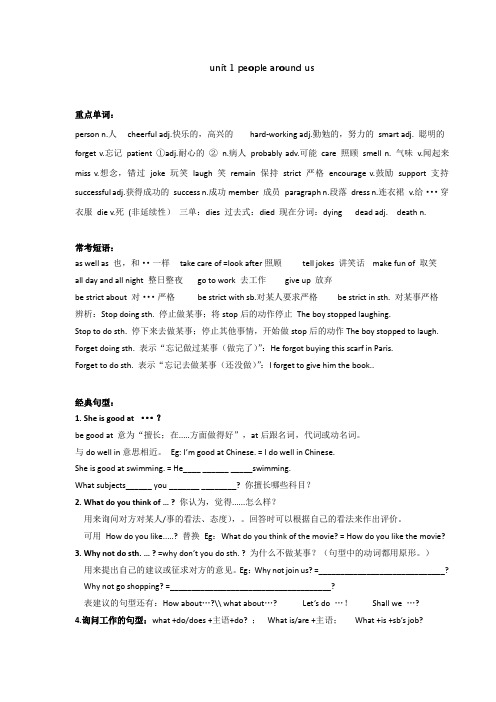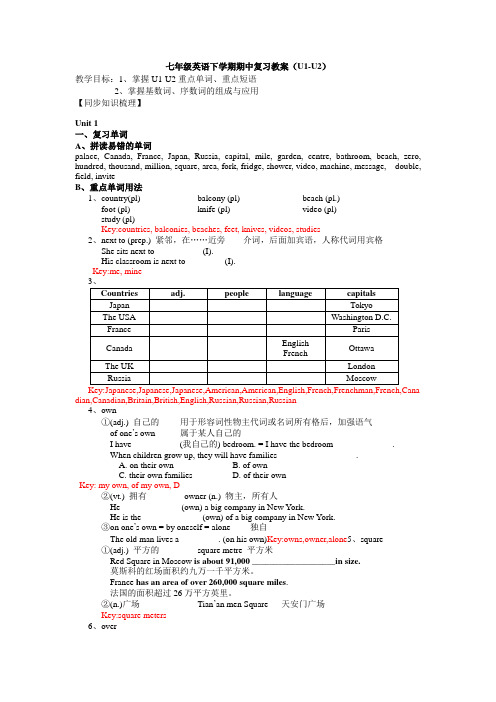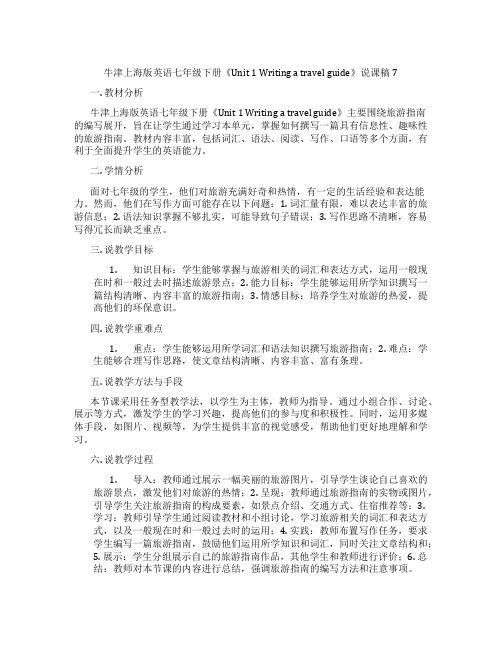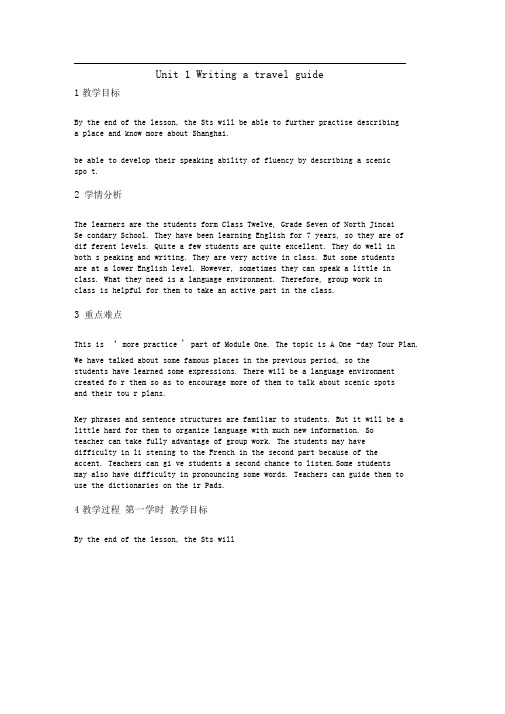牛津沪教版英语七年级下Unit1 复习教案
【最新】七年级英语下册Unit1Writingatravelguide教学设计新版牛津上海版

Unit 1 Writing a travel guide1 教课目的By the end of the lesson, the Sts will ⋯be able to further practise describing a place and know more about Shanghai.be able to develop their speaking ability of fluency by describing a scenic spot.2 学情剖析The learners are the students form Class Twelve, Grade Seven of North Jincai Secondary School. They have been learning English for 7 years, so they are of different levels. Quite a few students are quite excellent. They do well in both speaking and writing. They are very active in class. But some students are at alower English level. However, sometimes they can speak a little in class. Whatthey need is a language environment. Therefore, group work in class is helpfulfor them to take an active part in the class.3 要点难点This is ‘more practice ’part of Module One. The topic is A One -day Tour Plan. We have talked about some famous places in the previous period, so the studentshave learned some expressions. There will be a language environment created for them so as to encourage more of them to talk about scenic spots and their tour plans.Key phrases and sentence structures are familiar to students. But it will be alittle hard for them to organize language with much new information. So teachercan take fully advantage of group work. The students may have difficulty in listening to the French in the second part because of the accent. Teachers can give students a second chance to students may also have difficulty inpronouncing some words. Teachers can guide them to use the dictionaries on their Pads.4 教课过程第一学时教课目的By the end of the lesson, the Sts will ⋯be able to further practise describing a place and know more about Shanghai.be able to develop their speaking ability of fluency by describing a scenic spot.学时要点This is ‘more practice ’part of Module One. The topic is A One -day Tour Plan. We have talked about some famous places in the previous period, so the studentshave learned some expressions. There will be a language environment created for them so as to encourage more of them to talk about scenic spots and their tour plans.学时难点Key phrases and sentence structures are familiar to students. But it will be alittle hard for them to organize language with much new information. So teachercan take fully advantage of group work. The students may have difficulty in listening to the French in the second part because of the accent. Teachers can give students a second chance to students may also have difficulty inpronouncing some words. Teachers can guide them to use the dictionaries on their Pads.教课活动活动1【导入】Lead inIt ’s said that they really enjoyed the trip to Shanghai. Do you want to know where they have been? I will show you some pictures of places they ’ve been. Ple ase take notes when you are watching.T gives the following instructions:1. I will show you some pictures of places they ’ve been.2. Please take notes when you are watching.3. After that, please tell me how many places are there altogether and what they are.T shows four pictures of some places.S answers according to the picture.T corrects the mistakes and may show the pictures again if necessary.(Pudong International Airport, the bund, Yu garden, Shanghai zoo, Xintiandi, Shanghai Science and Technology Museum and Shanghai Museum)活动2【活动】Input -listeningT: Among these pictures, do you know their favourite place?Students may give some answers or no answer.T: I ’ve invited 4 French students to talk about their favourite places. Let ’s listen to them. Please take notes while listening.T plays the recording one by one.T invites students to give answers and give reasons.T gives feedback if the students ’answers are wrong.活动3【活动】Input -readingT: French students told me that they wanted to know more about Shanghai, aboutthose they have be en to, and also about those they haven ’t. Would you please give them some introductions about more places? First, you need to read some instructions.T gives the instructions.1. Work in a group of 6.2. Each group needs to read 8 passages and find useful information as much as possible.3. Take notes and finish the table.4. Group A is responsible for sightseeing, Group B shopping and Group C eating.T provides individual drilling.活动4【活动】Output -an introduction about a scenic spotT invites some students to introduce some scenic spots according to the informa tion they have taken down.T gives feedbacks about their presentations.活动5【活动】Output -a tour planT: I think they will enjoy those places. So why not make a tour plan for them? Please discuss with your group members and make a one-day tour plan for them. E ach group needs to focus on your task. (Group A sightseeing Group B eating Grou p C shopping.)T provides individual drilling.T invites some students to give presentations about their tour plans.T gives feedbacks about their presentations.活动6【作业】AssignmentT: Write down your 3-day tour plan for French students. The school may use your plan next year.e.g.: On the first day, they are going to ⋯。
沪教牛津版英语七年级下册Unit1学习要点汇总

unit 1 people around us重点单词:person n.人cheerful adj.快乐的,高兴的hard-working adj.勤勉的,努力的smart adj. 聪明的forget v.忘记patient ①adj.耐心的②n.病人probably adv.可能care 照顾smell n. 气味v.闻起来miss v.想念,错过joke 玩笑laugh 笑remain 保持strict 严格encourage v.鼓励support 支持successful adj.获得成功的success n.成功member 成员paragraph n.段落dress n.连衣裙v.给···穿衣服die v.死(非延续性)三单:dies 过去式:died 现在分词:dying dead adj. death n.常考短语:as well as 也,和··一样take care of =look after照顾tell jokes 讲笑话make fun of 取笑all day and all night 整日整夜go to work 去工作give up 放弃be strict about 对···严格be strict with sb.对某人要求严格be strict in sth. 对某事严格辨析:Stop doing sth. 停止做某事;将stop后的动作停止The boy stopped laughing.Stop to do sth. 停下来去做某事;停止其他事情,开始做stop后的动作The boy stopped to laugh. Forget doing sth. 表示“忘记做过某事(做完了)”:He forgot buying this scarf in Paris.Forget to do sth. 表示“忘记去做某事(还没做)”:I forget to give him the book..经典句型:1. She is good at ···?be good at 意为“擅长;在.....方面做得好”,at后跟名词,代词或动名词。
牛津译林版七年级英语下学期期中复习教学案设计(Unit1-Unit2)

七年级英语下学期期中复习教案(U1-U2)教学目标:1、掌握U1-U2重点单词、重点短语2、掌握基数词、序数词的组成与应用【同步知识梳理】Unit 1一、复习单词A、拼读易错的单词palace, Canada, France, Japan, Russia, capital, mile, garden, centre, bathroom, beach, zero, hundred, thousand, million, square, area, fork, fridge, shower, video, machine, message, double, field, inviteB、重点单词用法1、country(pl)__________ balcony (pl) _________ beach (pl.)__________foot (pl)_____________ knife (pl)___________ video (pl)___________study (pl)__________Key:countries, balconies, beaches, feet, knives, videos, studies2、next to (prep.) 紧邻,在……近旁介词,后面加宾语,人称代词用宾格She sits next to___________(I).His classroom is next to_________(I).Key:me, minedian,Canadian,Britain,British,English,Russian,Russian,Russian4、own①(adj.) 自己的用于形容词性物主代词或名词所有格后,加强语气of one’s own 属于某人自己的I have___________(我自己的) bedroom. = I have the bedroom _____________.When children grow up, they will have families__________________.A. on their ownB. of ownC. their own familiesD. of their ownKey: my own, of my own, D②(vt.) 拥有owner (n.) 物主,所有人He______________(own) a big company in New York.He is the______________(own) of a big company in New York.③on one’s own = by oneself = alone 独自The old man lives a_________. (on his own)Key:owns,owner,alone5、square①(adj.) 平方的square metre 平方米Red Square in Moscow is about 91,000 ___________________in size.莫斯科的红场面积约九万一千平方米。
牛津上海版英语七年级下册《Unit 1 Writing a travel guide》说课稿7

牛津上海版英语七年级下册《Unit 1 Writing a travel guide》说课稿7一. 教材分析牛津上海版英语七年级下册《Unit 1 Writing a travel guide》主要围绕旅游指南的编写展开,旨在让学生通过学习本单元,掌握如何撰写一篇具有信息性、趣味性的旅游指南。
教材内容丰富,包括词汇、语法、阅读、写作、口语等多个方面,有利于全面提升学生的英语能力。
二. 学情分析面对七年级的学生,他们对旅游充满好奇和热情,有一定的生活经验和表达能力。
然而,他们在写作方面可能存在以下问题:1. 词汇量有限,难以表达丰富的旅游信息;2. 语法知识掌握不够扎实,可能导致句子错误;3. 写作思路不清晰,容易写得冗长而缺乏重点。
三. 说教学目标1.知识目标:学生能够掌握与旅游相关的词汇和表达方式,运用一般现在时和一般过去时描述旅游景点;2. 能力目标:学生能够运用所学知识撰写一篇结构清晰、内容丰富的旅游指南;3. 情感目标:培养学生对旅游的热爱,提高他们的环保意识。
四. 说教学重难点1.重点:学生能够运用所学词汇和语法知识撰写旅游指南;2. 难点:学生能够合理写作思路,使文章结构清晰、内容丰富、富有条理。
五. 说教学方法与手段本节课采用任务型教学法,以学生为主体,教师为指导。
通过小组合作、讨论、展示等方式,激发学生的学习兴趣,提高他们的参与度和积极性。
同时,运用多媒体手段,如图片、视频等,为学生提供丰富的视觉感受,帮助他们更好地理解和学习。
六. 说教学过程1.导入:教师通过展示一幅美丽的旅游图片,引导学生谈论自己喜欢的旅游景点,激发他们对旅游的热情;2. 呈现:教师通过旅游指南的实物或图片,引导学生关注旅游指南的构成要素,如景点介绍、交通方式、住宿推荐等;3.学习:教师引导学生通过阅读教材和小组讨论,学习旅游相关的词汇和表达方式,以及一般现在时和一般过去时的运用;4. 实践:教师布置写作任务,要求学生编写一篇旅游指南,鼓励他们运用所学知识和词汇,同时关注文章结构和;5. 展示:学生分组展示自己的旅游指南作品,其他学生和教师进行评价;6. 总结:教师对本节课的内容进行总结,强调旅游指南的编写方法和注意事项。
牛津沪教版英语七年级下Unit1新课讲义(答案不全)

七年级下Unit 1一、新课讲解【词汇学习】1)decide [d?'sa?d]【词性】v. 【词义】下决心;(使)决定,解决,裁决,肯定,断定【例句】They decided against an expensive education for their children.2)beauty ['bju?ti]【词性】n. 【词义】美丽,美好的事物【例句】I shall never forget the beauty of the West Lake.3)local ['l??kl]【词性1】adj. 【词义1】当地的,地方的【词性2】v. 【词义2】找出位置,设置【例句】The hospital is to be located in the suburbs.4)tour [t??]【词性1】n. 【词义1】旅行,观光【词性2】v. 【词义2】旅行,观光【易混淆点】tourist n.旅游者tourism n.旅游业【例句】We are going to tour Europe.5)discuss [d?'sk?s]【词性】v. 【词义】讨论,商议【例句】Shall we discuss where we are going for our holiday?6)famous ['fe?m?s]【词性】adj. 【词义】著名的【易混淆点】fame n.名望,声望【例句】He is famous for his learning.7)international [??nt?'n??n?l]【词性】adj. 【词义】国际的,世界的【易混淆点】national adj.国家的,民族的,某国家或民族特有的【例句】The United Nations is an international organization.8)know [n??]【词性】v. 【词义】懂得,知道,了解,熟悉【易混淆点】knowledge n.(u) 知识,学问,了解【例句】They knew themselves to be in a difficult position.9)surprise [s?'pra?z]【词性1】v. 【词义1】使惊讶,使诧异【词性2】n. 【词义2】使人惊讶的事【易混淆点】surprised adj. 感到惊讶的;出人意外的surprising adj. 令人惊异的;惊人的【例句】His good marks surprised his father.10)convenient [k?n'vi?ni?nt]【词性】adj. 【词义】方便的【例句】It’s not convenient for me to ring him up.11)science ['sa??ns]【词性】n. 【词义】科学(一门学科)【易混淆点】scientist n. 科学家【例句】His ambition is to be a scientist in the future.12)information [??nf?'me??n]【词性】n. 【词义】通知,情报,消息【易混淆点】inform v. 告诉,通知,告发【例句】You can get information about the famous place from the travel service. 13)reason ['ri?zn]【词性】n. 【词义】理由,原因【易混淆点】reasonable adj. 理智的,合理的,公道的【例句】I’m willing to pay a reasonable offer.14)interest ['?ntr?st]【词性】n. 【词义】兴趣,趣味,关心【易混淆点】interested adj. 使……感兴趣interesting adj. 感兴趣的【例句】The book caused great interest and argument.【上海著名地标】1)People's Square2)Yu Garden3)Suzhou Creek4)the Huangpu River5)the Bund6)Shanghai Grand Theatre7)Shanghai Museum8)Shanghai Zoo9)Shanghai Botanical Gardens10)Shanghai Wild Animal Park11)Shanghai Science and Technology Museum 12)Century Park 人民广场豫园苏州河黄浦江外滩上海大剧院上海博物馆上海动物园上海植物园上海野生动物园上海科技馆世纪公园13)Oriental Pearl TV Tower14)Pudong New District15)Grand Gateway Plaza16)Sheshan State Resort17)Dongping National Forest Park 18)Changfeng Park19)Luxun Park20)Longhua Temple21)Yangpu Bridge22)Nanpu Bridge23)Lupu Bridge 东方明珠电视塔浦东新区港汇广场佘山国家旅游度假区东平国家森林公园长风公园鲁迅公园龙华寺杨浦大桥南浦大桥卢浦大桥【条件状语从句】一、定义:表示假定主句某事发生的条件。
牛津沪教版英语七年级下Unit 1新课讲义(答案不全)

七年级下Unit 1一、新课讲解【词汇学习】1)decide [dɪ'saɪd]【词性】v. 【词义】下决心;(使)决定,解决,裁决,肯定,断定【例句】They decided against an expensive education for their children.2)beauty ['bjuːti]【词性】n. 【词义】美丽,美好的事物【例句】I shall never forget the beauty of the West Lake.3)local ['ləʊkl]【词性1】adj. 【词义1】当地的,地方的【词性2】v. 【词义2】找出位置,设置【例句】The hospital is to be located in the suburbs.4)tour [tʊə]【词性1】n. 【词义1】旅行,观光【词性2】v. 【词义2】旅行,观光【易混淆点】tourist n.旅游者tourism n.旅游业【例句】We are going to tour Europe.5)discuss [dɪ'skʌs]【词性】v. 【词义】讨论,商议【例句】Shall we discuss where we are going for our holiday?6)famous ['feɪməs]【词性】adj. 【词义】著名的【易混淆点】fame n.名望,声望【例句】He is famous for his learning.7)international [͵ɪntə'næʃnəl]【词性】adj. 【词义】国际的,世界的【易混淆点】national adj.国家的,民族的,某国家或民族特有的【例句】The United Nations is an international organization.8)know [nəʊ]【词性】v. 【词义】懂得,知道,了解,熟悉【易混淆点】knowledge n.(u) 知识,学问,了解【例句】They knew themselves to be in a difficult position.9)surprise [sə'praɪz]【词性1】v. 【词义1】使惊讶,使诧异【词性2】n. 【词义2】使人惊讶的事【易混淆点】surprised adj. 感到惊讶的;出人意外的surprising adj. 令人惊异的;惊人的【例句】His good marks surprised his father.10)convenient [kən'viːniənt]【词性】adj. 【词义】方便的【例句】It’s not convenient for me to ring him up.11)science ['saɪəns]【词性】n. 【词义】科学(一门学科)【易混淆点】scientist n. 科学家【例句】His ambition is to be a scientist in the future.12)information [͵ɪnfə'meɪʃn]【词性】n. 【词义】通知,情报,消息【易混淆点】inform v. 告诉,通知,告发【例句】You can get information about the famous place from the travel service. 13)reason ['riːzn]【词性】n. 【词义】理由,原因【易混淆点】reasonable adj. 理智的,合理的,公道的【例句】I’m willing to pay a reasonable offer.14)interest ['ɪntrəst]【词性】n. 【词义】兴趣,趣味,关心【易混淆点】interested adj. 使……感兴趣interesting adj. 感兴趣的【例句】The book caused great interest and argument.【上海著名地标】1)People's Square2)Yu Garden3)Suzhou Creek4)the Huangpu River5)the Bund6)Shanghai Grand Theatre7)Shanghai Museum8)Shanghai Zoo9)Shanghai Botanical Gardens10)Shanghai Wild Animal Park11)Shanghai Science and Technology Museum 12)Century Park 人民广场豫园苏州河黄浦江外滩上海大剧院上海博物馆上海动物园上海植物园上海野生动物园上海科技馆世纪公园13)Oriental Pearl TV Tower14)Pudong New District15)Grand Gateway Plaza16)Sheshan State Resort17)Dongping National Forest Park 18)Changfeng Park19)Luxun Park20)Longhua Temple21)Yangpu Bridge22)Nanpu Bridge23)Lupu Bridge 东方明珠电视塔浦东新区港汇广场佘山国家旅游度假区东平国家森林公园长风公园鲁迅公园龙华寺杨浦大桥南浦大桥卢浦大桥【条件状语从句】一、定义:表示假定主句某事发生的条件。
新沪教牛津版七年级下册英语Unit 1 Speaking and writing课件

My _b__ig__e_y_eiss ____________. Every day, he goes to work
____b__y__b__fi__ka__et__hS_e_or_m_e_t_im_.eHsaehteaelhasoacsh_et_or_____________w____o__r__k___,la_bteuevtehrey
1. Look! He is repairing a pair of shoes carefully. 2. I don’t care if she goes there. Pay attention to this word with /eə/.
their
第七页,共二十三页。
Pay attention to these words with /uə/. Read them aloud.
第五页,共二十三页。
Pay attention to these words with /eə/. Read them aloud.
air care there
hair dare where
repair square
第六页,共二十三页。
Pay attention to these sentences with /eə/. Read them aloud.
第二十一页,共二十三页。
Exercise
Now, write something about the person you love! PS: Prepare an oral
presentation.
I love ____m_y__f_a_th__e_r_. he has ____s_h_o_r_t_ hair and _____________.
牛津版上海版七年级下册Unit1Writingatravelguide

Unit 1 Writing a travel guide1教学目标By the end of the lesson, the Sts will be able to further practise describinga place and know more about Shanghai.be able to develop their speaking ability of fluency by describing a scenicspo t.2 学情分析The learners are the students form Class Twelve, Grade Seven of North JincaiSe condary School. They have been learning English for 7 years, so they are ofdif ferent levels. Quite a few students are quite excellent. They do well inboth s peaking and writing. They are very active in class. But some studentsare at a lower English level. However, sometimes they can speak a little in class. What they need is a language environment. Therefore, group work inclass is helpful for them to take an active part in the class.3 重点难点-day Tour Plan. This is ‘ more practice ' part of Module One. The topic is A OneWe have talked about some famous places in the previous period, so thestudents have learned some expressions. There will be a language environment created fo r them so as to encourage more of them to talk about scenic spotsand their tou r plans.Key phrases and sentence structures are familiar to students. But it will be a little hard for them to organize language with much new information. Soteacher can take fully advantage of group work. The students may havedifficulty in li stening to the French in the second part because of theaccent. Teachers can gi ve students a second chance to listen.Some studentsmay also have difficulty in pronouncing some words. Teachers can guide them touse the dictionaries on the ir Pads.4教学过程第一学时教学目标By the end of the lesson, the Sts willbe able to further practise describing a place and know more about Shanghai.be able to develop their speaking ability of fluency by describing a scenic spot.学时重点This is ‘ more practice ' part of Module One. The topic is A One -day Tour Plan.We have talked about some famous places in the previous period, sothe studentshave learned some expressions. There will be a language environmentcreated for them so as to encourage more of them to talk about scenic spotsand their tourplans.学时难点Key phrases and sentence structures are familiar to students.But it will be alittle hard for them to organize language with much newinformation. So teachercan take fully advantage of group work. The students may havedifficulty in listening to the French in the second part because of the accent.Teachers can give students a second chance to listen.Some students may also havedifficulty inpronouncing some words. Teachers can guide them to use thedictionaries on theirPads.教学活动活动 1【导入】LeadinIt ' s said that they really enjoyed the trip to Shanghai. Do youwant to know w ' ve been. Ple here they have been? I will show you some pictures ofplaces theyase take notes when you arewatching.T gives the followinginstructions:1. I will show you some pictures of places they ' ve been.2. Please take notes when you arewatching.3. After that, please tell me how many places are there altogether and what theyare.T shows four pictures of someplaces.S answers according to thepicture.T corrects the mistakes and may show the pictures again if necessary.(Pudong International Airport, the bund, Yu garden, Shanghai zoo, Xintiandi, Sh anghai Science and Technology Museum and Shanghai Museum)活动 2【活动】 Input - listeningT: Among these pictures, do you know their favourite place?Students may give some answers or no answer.T: I 've invited 4 French students to talk about their favourite places. Let listen to them. Please take notes while listening.T plays the recording one by one.T invites students to give answers and give reasons.T gives feedback if the students 活动 3【活动】 Input - readingT: French students told me that they wanted to know more about Shanghai, about ' t. Wouldyou please give them some introductions about more places? First, you need to read some ins tructions.T gives the instructions.1. Work in a group of 6.2. Each group needs to read 8 passages and find useful information as much as p ossible.3. Take notes and finish the table.4. Group A is responsible for sightseeing, Group B shopping and Group Ceating.T provides individual drilling.answers are wrong.those they have be en to, and also about those they haven活动 4【活动】Output -an introduction about a scenic spot T invites some students to introduce some scenic spots according to the informa tion they have taken down.T gives feedbacks about their presentations.活动 5【活动】Output - a tour planT: I think they will enjoy those places. So why not make a tour plan for them?Please discuss with your group members and make a one-day tour plan for them.E ach group needs to focus on your task. (Group A sightseeing Group B eating Grou p C shopping.)T provides individual drilling.T invites some students to give presentations about their tour plans.T gives feedbacks about their presentations.活动 6【作业】AssignmentT: Write down your 3-day tour plan for French students. The school may use your plan next year.e.g.: On the first day, they are going to。
- 1、下载文档前请自行甄别文档内容的完整性,平台不提供额外的编辑、内容补充、找答案等附加服务。
- 2、"仅部分预览"的文档,不可在线预览部分如存在完整性等问题,可反馈申请退款(可完整预览的文档不适用该条件!)。
- 3、如文档侵犯您的权益,请联系客服反馈,我们会尽快为您处理(人工客服工作时间:9:00-18:30)。
go camping去野营;go cycling去骑车;go boating去划船;go hiking去徒步旅行
go skating去溜冰;go windsurfing去风帆冲浪;go hunting去打猎
【拓展】a sightseeing bus观光旅游车 a sightseeing tour观光旅游
5. in the centre of 位于……的中部
【比较】in the centre of 强调与四周距离相等的中心位置,常用来指空间;in the middle of
强调两端之间的位置,并不强调中心,既可用于指空间,也可用于指时间。
如:There is a beautiful fountain in the centre of People’s Square. 人民广场中央有一个美丽的喷泉。
(指中心位置)
They usually have noodles in the middle of the day. 他们通常在中午吃面。
(指时间)
She saw a big dog running in the middle of the street. 她看见有只狗在街道中间跑。
(指空间)
批注:用in the center of 和in the middle of 造句加以区分
6. in the south of 位于……的南部
【联想】类似的表达:in the north of位于……的北部, in the west of位于……的西部, in the east of位于……的东部
【注意】用英语表达方位时,north和south 通常放在east和west之前。
如:northeast东北,northwest西北,southeast东南,southwest西南
【拓展】in the south of 位于……的南部,强调在某一个范围之内;如两地接壤用on the south of;两地不相邻用(to the) south of,如:
A is in the south of B. (B包含A)
A is on the south of B. (A和B接壤)
A is (to the) south of B. (A和B不相邻)
指点迷津:in the south of, on the south of与(to the) south of
A包含B A与B接壤A与B不相邻
B is in the south of A. B is on the south of A. B is (to the) south of A.
批注:通过画图板书,让学生区分介词in,on,to的不同用法。
用法口诀:In to on,内外接
7. on Chongming Island 位于崇明岛上
【注意】表示在岛屿上时,介词要用on
8. get on with 进展
如:How are you getting on with your project? 你们的项目进展如何?
【联想】get on with相当于get along with 还可以表示“与……相处”的意思。
如:How are you getting on with you new classmates? 你和你的新同学们相处得怎样?
get on well with sb.表示“与……相处融洽”。
牛津沪教版英语七年级下Unit1 复习教案
11 / 11。
